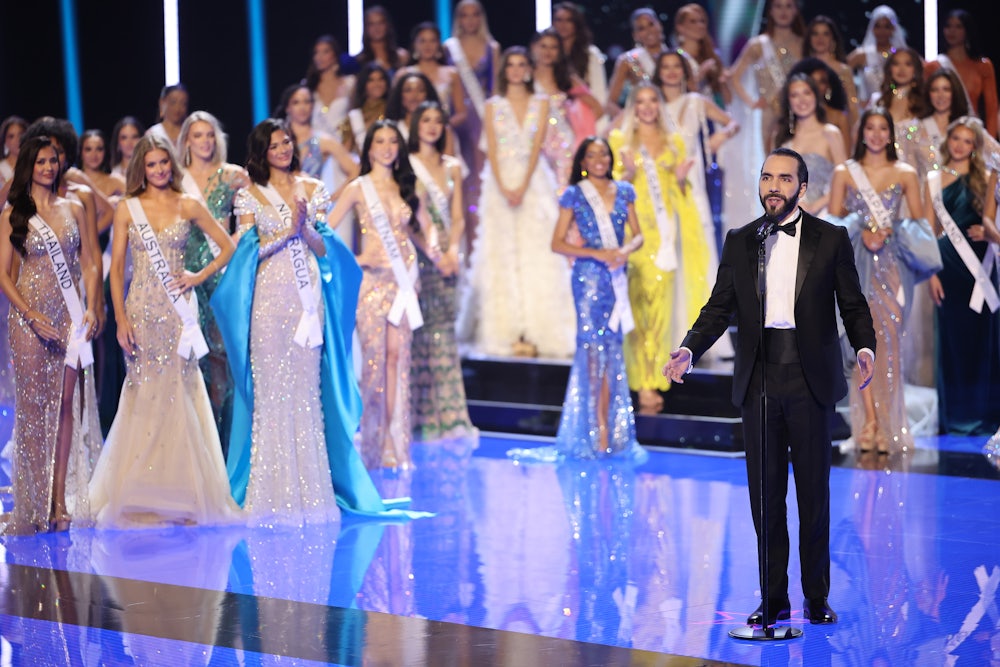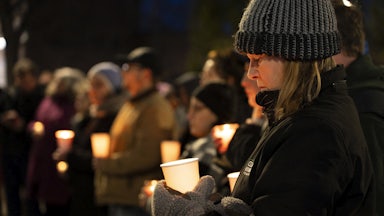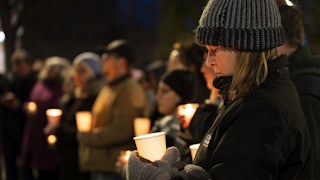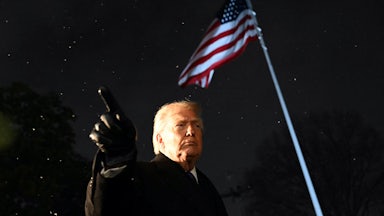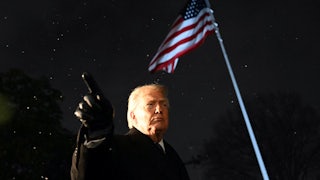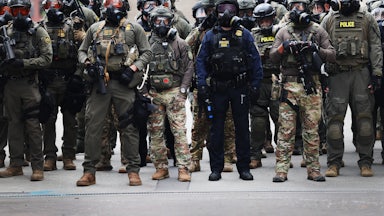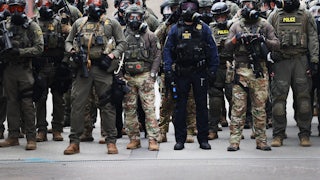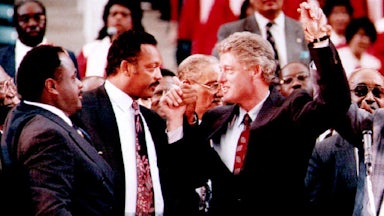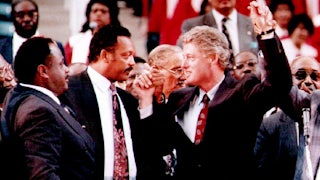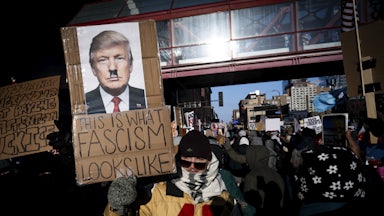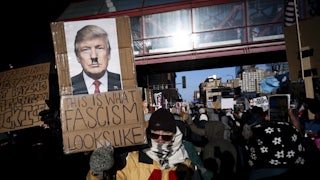Several thousand people crowded near the entrance to the national gymnasium of El Salvador at dusk on November 15, waiting to take their seats for the preliminary round of the 2023 Miss Universe pageant. From within the throng, one group screamed the name of a country in unison, prompting rivals to do the same. “Honduras!” “Thailand!” “Venezuela!” They wore low-backed gowns and sequined sport coats, some of them accessorizing with their country’s flag draped over their shoulders. A warm breeze carried the scent of cologne. Imagine the World Cup as a black-tie event.
The gymnasium, in the heart of the capital, San Salvador, had been recently remodeled—one of many costs of hosting the pageant, which the administration of Salvadoran President Nayib Bukele said totaled around $100 million. Projected onto the building’s new, curving exterior were thousands of sparkles that formed the words “72nd Miss Universe El Salvador” before bursting apart again, on loop. Nearby, fountains leaped skyward at coordinated intervals, backlit by a soft purple glow. And hanging on crowd-control barriers were banners that read, in English, “Magical El Salvador.”
That was the Bukele administration’s slogan for the pageant, trumpeted on roadside pennants across the small Central American country. But it’s also a fitting description of what the 42-year-old president hopes to accomplish with events like Miss Universe, as he seeks a blatantly unconstitutional second consecutive term in office: To wave away all the attention being drawn to the massive human rights abuses and autocratic maneuvers from his first five-year term—to make it magically disappear, as it were, with a bit of pomp and sleight of hand.
Bukele knows about making things disappear, after all. While much of the international attention paid to the young president concerns his social media savvy and financially reckless obsession with bitcoin, which he made legal tender in 2021, his administration’s gang crackdown since early last year has resulted in the disappearance of thousands upon thousands of Salvadorans into the churn of the country’s prison system. They’ve been detained on bogus charges, their families say, and they’re not allowed visits even from lawyers. Many families aren’t told where their loved one is being held, and it is not uncommon for them to later find out that he or she died in unexplained circumstances.
This was not news, surely, to many of the pageant’s VIP attendees during the three-day event, who included U.S. Ambassador William Duncan, Salvadoran prisons director and Deputy Security Minister Osiris Luna Meza (whom the U.S. State Department has accused of “significant corruption related to government contracts and bribery”), plus various judicial and congressional officials allied with Bukele. But what about the participants?
Noelia Voigt, Miss USA, did some research before traveling to El Salvador. She learned about the civil war from 1979 to 1992 and how the country under Bukele “had finally overcome this really difficult period,” she said after rehearsal one day. The kind of struggles that El Salvador had faced were similar to ones she’d heard of from her mother, who is half-Venezuelan. But then she arrived and was whisked by the government to gorgeous sites, like the Pacific beaches that Bukele has rebranded “Surf City.” Everywhere the tour went, Voigt said, she heard “this revival story. They’re doing so much better.”
Jordanne Lauren Levy, competing for Jamaica, was also impressed. The words she used were Bukele’s: “It does feel very magical.”
In late 2020, in a federal court in New York, the U.S. government indicted the 14 most powerful members of the Mara Salvatrucha gang, or MS-13, on terrorism charges, alleging that they had ordered murders and other crimes in the United States, El Salvador, Mexico, and elsewhere. But most of the men were reportedly in prison in El Salvador. Over the next two years, the U.S. pressed Bukele to extradite 12 of them, but the Salvadoran justice system—which Bukele had overhauled, stacking it with friendly judges—continually refused, claiming constitutional concerns.
El Salvador’s murder rate had fallen precipitously since Bukele took office in mid-2019. He attributed this to a vague security policy, but a joint investigation by Alharaca and La Prensa Gráfica concluded that the policy amounted to little more than a P.R. campaign. It turned out that murders had declined for a much more nefarious reason, which only came to light after a bloodbath erupted around the country in March 2022: Eighty-seven people, most of whom had no gang affiliation, were killed over the course of three days.
El Faro reported in September 2020 that MS-13 and the Bukele administration had struck a pact shortly after he took office, in which the gang’s leaders delivered political support and reduced murders in exchange for “financial benefits,” cell phones, and visits from sex workers in prison for the gang’s elite. (Administration officials were assigned code names for the negotiations; Bukele’s was “Batman.”) But then a group of MS-13 leaders were arrested as they were being chauffeured in a government vehicle to a meeting with the administration, and the gang responded with indiscriminate violence.
The administration denied the existence of a pact and used the killing spree as an excuse to suspend most constitutional rights, declaring a state of emergency that remains in place today. Since then, security forces have arbitrarily jailed more than 1 per cent of the population—more than 70,000 people, many of them not affiliated with gangs. Prisoners are being tortured and executed. The government denies these abuses, but the human rights group Cristosal reported in May that prisoners are forced to eat food with their mouths off the floor, denied lifesaving medical care, and murdered by strangulation or beatings. On the streets, the police and military keep the population docile by threatening arrest for anything they don’t like, whether union organizing or rebuffing the advances of officers.
The Salvadoran Constitution, which dates to 1983, bars presidential reelection—to prevent the recurrence of military dictatorships. Nevertheless, two years ago, the constitutional chamber of the Supreme Court—which is composed entirely of Bukele’s picks—decided the Constitution did allow it, an interpretation that most analysts say is illegitimate. But it sufficiently muddied the political waters to allow Bukele, in September, to announce his bid for a second consecutive term.
There is no one left to tell him “no.” His party won a legislative supermajority, and, together, they have crippled the democratic counterweights. All three branches of the government are loyal to him, as are the security forces. The election is about 60 days away. In late November, Bukele was granted leave from the presidency to conduct his campaign, and he handed the reins of the state to his private secretary, Claudia Juana Rodríguez.
Meanwhile, it’s not clear whether Bukele’s deal with MS-13 is alive or dead. His administration continues to protect the gang’s leaders from extradition to New York. But on November 9, one of them—Elmer Canales Rivera, better known by his alias, “Crook de Hollywood”—was found hiding in Mexico and was handed over to the U.S. The story led the news the next day, overshadowing a Miss Universe photo-op at a hospital in San Salvador, where the candidates visited children with cleft palates.
One day after lunch, Isabella García-Manzo flopped into a soft chair and, with a smile, complained about her aching feet. As Miss El Salvador, she had been wearing stilettos for days. And as the daughter of a Guatemalan businessman who has founded companies with Bukele and supported the expansion of Bukele’s political project into Guatemala, she had nothing but praise for the president.
“It’s the perfect moment for the world to see what El Salvador is made of,” she said. “In the past four years, we have been reborn.”
Most of the country seems to agree: Bukele’s approval rating hovers around 90 percent. A former executive at his family’s public relations firm, he knows well how to create and sell fantasy. With Miss Universe, he was molding 84 new messengers to be deployed around the world after the pageant. But not everyone in El Salvador was in thrall to the show.
On the morning of the pageant’s final round, a group of several hundred people gathered at the Monument to the Constitution, a statue of an unclothed woman holding the scales of justice that is usually referred to as—in a classic example of Salvadoran humor—la chulona, “the naked lady.” But the atmosphere that day was somber. These were family members of people taken prisoner under the state of emergency, organized into a collective called MOVIR.
Many of the families had left their rural hamlets in the middle of the night to reach San Salvador on time. They fashioned paper sashes across their chests like the Miss Universe competitors, scrawling hand-drawn titles like “Miss Arbitrary Arrests,” “Miss Imprisoned Union Members,” “Miss Mass Trials,” and “Miss Debt.” They held photos of the faces of their incarcerated loved ones. One sign protested that the administration had freed Crook while thousands of innocents languished.
They marched toward the Intercontinental Hotel, where the Miss Universe contestants were staying, about two and a half kilometers away. As they drew closer, there were more police and soldiers, and some of the children started to cry, triggered by the uniforms they last saw when their parents were hauled away. Some people, suspecting a crackdown was imminent, panicked and peeled off. Many kept marching. “Our intention wasn’t to be shocking,” Samuel Ramírez, a representative of the families, later told me. “We aren’t interested in spectacle. We’re interested in turning the spotlight to the victims.”
They were just a few blocks from the Intercontinental when they made a last turn onto a boulevard that was blocked by dozens of police and soldiers, who belted into a loudspeaker, “Señores from MOVIR: You cannot proceed!” A soldier perched in the hatch of a Yagu-brand tank—reportedly acquired from Israel last year so Bukele could combat gangs—studied the families, his finger on the trigger. Ramírez stared back. A phrase came to his mind, associated with the Spanish classic Don Quixote: “Ladran, Sancho, señal que cabalgamos.” They’re barking because we’re making progress.
The families understood it would be impossible to reach the hotel. If they could have, they’d have given the women of Miss Universe a message, Ramírez told me: The families don’t blame them for participating in Bukele’s pageant, but the women were being lied to, and they needed to know the truth. They were in a country where people are wrongfully arrested and tortured and killed, where a dictatorship is dawning. But the security forces blocked the families from delivering their message. So they stood in the street, hoisting their signs and speaking with the congregated press, then disbanded and returned home.
The scene was a stark contrast with my own experience traveling these streets three days earlier, when several hundred members of the foreign and local press gathered at the National University to be bused to the renovated gymnasium for the preliminary round. I was well acquainted with San Salvador gridlock, having spent much of my adult life living here, so I knew that in normal afternoon traffic, the three-and-a-half-kilometer trip could easily take 30 minutes. But today, we were the Miss Universe press, so our caravan was led and trailed by police on motorcycles who parted the sea of cars. This was also how the Miss Universe contestants had often been traveling, and, as I marveled at the suddenly breezy streets, it occurred to me what a peculiar experience this was in El Salvador—as if reality had been wiped away, magically.
